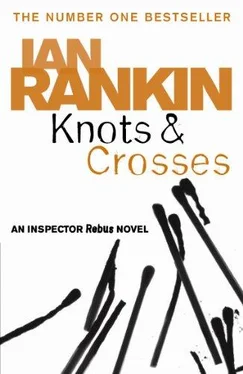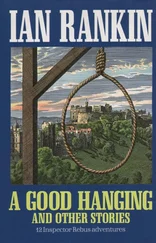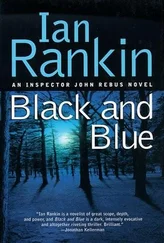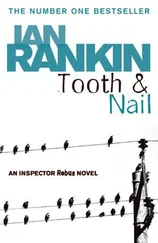‘Why are you doing this, Mister Knot?’ said Rebus, fingering the twine. ‘And just what are you doing?’
Inside, the flat was like a fridge: the pilot-light had blown out again.
The media, sensing that the ‘Edinburgh Strangler’ was not about to vanish in the night, took the story by its horns and created a monster. TV crews moved into some of the better hotel rooms in the city, and the city was happy enough to have them, it being not quite the tourist season yet.
Tom Jameson was as astute an editor as any, and he had a team of four reporters working on the story. He could not help noticing, however, that Jim Stevens was not on his best form. He seemed uninterested — never a good sign in a journalist. Jameson was worried. Stevens was the best he had, a household name. He would speak to him about it soon.
As the case grew along with the interest in it, John Rebus and Gill Templer became confined to communicating by telephone and via the occasional chance meeting in or around HQ. Rebus hardly saw his old station now. He was strictly a murder-case victim himself, and was told to think about nothing else during his waking hours. He thought about everything else: about Gill, about the letters, about his car’s inability to pass its MOT. And all the time he watched Anderson, father of Rhona’s lover, watched him as he grew ever more frantic for a motive, a lead, anything. It was almost a pleasure to watch the man in action.
As to the letters, Rebus had pretty much discounted his wife and daughter. A slight mark on Knot’s last missive had been checked by the forensic boys (for the price of a pint) and had turned out to be blood. Had the man nicked his finger while cutting the twine? It was yet another small mystery. Rebus’s life was full of mysteries, not the least of which was where his ten legitimate daily cigarettes went. He would open his packet of a late afternoon, count the contents, and find that he was supposed to have smoked all ten of his ration already. It was absurd; he could hardly remember smoking one of the alloted ten, never mind all of them. Yet a count of the butts in his ashtray would produce empirical evidence enough to withstand any denials on his part. Bloody strange though. It was as though he were shutting out a part of his waking life.
He was stationed in the HQ’s Incident Room at the moment, while Jack Morton, poor sod, was on door-to-door. From his vantage point he could see how Anderson was running the shambles. It was little wonder the man’s son had turned out to be less than bright. Rebus also had to deal with the many phone-calls — from those of the trying-to-be-helpfuls to those of the psychic-cranks-who-want-to-confess — and with the interviews carried out in the building itself at all hours of the day and night. There were hundreds of these, all to be filed and put into some kind of order of importance. It was a huge task, but there was always the chance that a lead would come from it, so he was not allowed to slack.
In the hectic, sweaty canteen he smoked cigarette number eleven, lying to himself that it was from the next day’s ration, and read the daily paper. They were straining for new, shocked adjectives now, having exhausted their thesauruses. The appalling, mad, evil crimes of The Strangler. This insane, evil, sex-crazed man. (They did not seem to mind that the killer had never sexually assaulted his victims.) Gymslip Maniac! ‘What are our police doing? All the technology in the world cannot replace the reassurance offered by bobbies on the beat. WE NEED THEM NOW.’ That was from James Stevens, our crime correspondent. Rebus remembered the stocky drunk man from the party. He recalled the look on Stevens’ face when he had been told Rebus’s name. That was strange: Everything was bloody strange. Rebus put down the newspaper. Reporters. Again, he wished Gill well in her job. He studied the blurred photograph on the front of the tabloid. It showed a crop-haired, unintelligent child. She was grinning nervously, as though snapped at a moment’s notice. There was a slight, endearing gap between her front teeth. Poor Nicola Turner, aged twelve, a pupil at one of the southside’s comprehensive schools. She had no attachments to either of the other dead girls. There were no visible links between them, and what was more, the killer had moved up a year, choosing a High School kid this time. So there was to be no regularity about his choice of age-groups. The randomness continued unabated. It was driving Anderson nuts.
But Anderson would never admit that the killer had his beloved police force tied in knots. Tied in absolute knots. Yet there had to be clues. There had to be. Rebus drank his coffee and felt his head spin. He was feeling like the detective in a cheap thriller, and wished that he could turn to the last page and stop all his confusion, all the death and the madness and the spinning in his ears.
Back in the Incident Room, he gathered together reports of phone-calls that had come in since he had left for his break. The telephonists were working flat out, and near them a telex-machine was almost constantly printing out some new piece of information thought useful to the case and sent on by other forces throughout the country.
Anderson pushed his way through the noise as if swimming in treacle.
‘A car is what we need, Rebus. A car. I want all the sightings of men driving away with children collated and on my desk in an hour. I want that bastard’s car.’
‘Yes, sir.’
And he was off again, wading through treacle deep enough to drown any normal human being. But not Indestructible Anderson, impervious to any danger. That made him a liability, thought Rebus, sifting through the piles of paper on his desk, which were meant to be in some system of order.
Cars. Anderson wanted cars, and cars he would have. There were swear-on-a-Bible descriptions of a man in a blue Escort, a white Capri, a purple Mini, a yellow BMW, a silver TR7, a converted ambulance, an ice-cream van (the telephone-caller sounding Italian and wishing to remain anonymous), and a great big Rolls-Royce with personalized number plates. Yes, let’s put them all into the computer and have it run a check of every blue Escort, white Capri, and Rolls-Royce in Britain. And with all that information at our fingertips … then what? More door-to-door, more gathering of telephone-calls and interviews, more paperwork and bullshit. Never mind, Anderson would swim through it all, indomitable amidst all the craziness of his personal world, and at the end of it all he would come out looking clean and shiny and untouchable, like an advertisement for washing powder. Three cheers.
Hip hip
Rebus had not enjoyed bullshit during his Army days either, and there had been plenty of it then. But he had been a good soldier, a very good soldier, when finally they had got down to soldiering. But then, in a fit of madness, he had applied to join the Special Air Squadron, and there had been very little bullshit there, and an incredible amount of savagery. They had made him run from the railway station to the camp behind a sergeant in his jeep. They had tortured him with twenty-hour marches, brutal instructors, the works. And when Gordon Reeve and he had made the grade, the SAS had tested them just that little bit further, just that inch too far, confining them, interrogating them, starving them, poisoning them, and all for a little piece of worthless information, a few words that would show they had cracked. Two naked, shivering animals with sacks tied over their heads, lying together to keep warm.
‘I want that list in an hour, Rebus,’ called Anderson, walking past again. He would have his list. He would have his pound of flesh.
Jack Morton arrived back, looking foot-weary and not at all amused with life. He slouched across to Rebus, a sheaf of papers under his arm, a cigarette in the other hand.
Читать дальше












